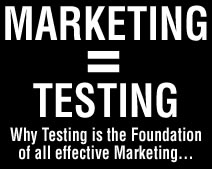If you’re familiar with marketing you’ll know that testing is a vital part of all effective marketing.
But the most successful marketers understand that marketing doesn’t just involve testing - marketing is testing.
If you’re running a new business or you’re new to the world of marketing, the concept of ‘testing’ might not sound particularly exciting. But for the Entrepreneur who is serious about growing their business, grasping its power can be a real turning point in the life of the business.
Stop Trying to choose the ‘Right’ Marketing Solution
Anyone who’s come from the corporate world will know the hours wasted trying to make a decision on the ‘right’ marketing approach.
A commitment to testing ends this problem once and for all. The smart marketer knows that the only way to be certain that a specific marketing approach will work, is to test it. As long as you test small (meaning you never spend more than you’re willing to lose) you have the freedom to go out to the market and test an array of marketing initiatives: pay per click, print advertising, telephone marketing, email marketing, Facebook advertising etc – and we let the market (your customers) decide which is going to work.
When we’ve found marketing approaches that our prospective customers respond to, we then test different elements within each method (different headlines on an ad, for example) to increase our response.
At the very least, you should be testing one new marketing approach every month. If you do that, this time next year you’ll have the results of twelve new marketing methods and chances are, several of those will be winners that you can roll out on a larger scale.
The Small Business Advantage
Small business owners have several very important advantages over their big-business counterparts when it comes to marketing and testing.
First, you are closer to the action. You are in a position to see and understand the direct and immediate connection between marketing and profits: you send out a sales letter on Monday, and by Friday you’re looking at your online sales figures. It’s clearly a case of cause and effect, and not just some random fluctuation in your income.
But the question is, how do we know what’s going to work?
And the answer is… we don’t.
We can’t.
We do know what tends to work. For example, we know that an ad with an attention-grabbing headline and compelling body copy leading to a strong call to action is going to work better than one not having these elements (although the two best selling sales letters in history didn’t have headlines – another argument for testing).
So what we do as marketers is we begin with what we know tends to work best, and we go from there.
In other words we test.
As Claude Hopkins, the father of advertising wrote in Scientific Advertising:
“Now we let the thousands decide what the millions will do. We make a small venture and watch cost and result. When we learn what a thousand customers cost, we know almost exactly what a million will cost. When we learn what they buy, we know what a million will buy. We establish averages on a small scale, and those averages always hold. We know our cost, we know our sale, and we know our profit and loss”.
This is the essence of marketing – testing.
Marketing is Testing
We begin with something small. Maybe a small ad, a low price cost per click campaign – or a small direct mail campaign.
Then we send it out once to a small list, say 1,000 names, or run it once in a publication. Because we will be measuring response by hits on our website, calls to our dedicated phone number, or even coupons through the post, we know how much profit that piece brought in.
If that revenue is more than the ad cost us to run or the letter to send, we have a winner. If we break even, it can still be a winner because our greater profits are in the long-term relationship with the customers.
If we make a loss we cannot justify even with the long-term profits, then we know we have to test again with a small sample before rolling it out to the wider audience.
This is why there is no such thing as failure in marketing – there is only a result. The only time you can fail is if you stop testing to ensure and increase profits.
Testing never stops. There are two reasons for this:
First, circumstances change. A web page or ad or sales letter that’s working today is unlikely to work forever. If you’re not continually testing and improving your marketing, then when the day comes that response drops off, you will be caught unprepared. So we spend much of our time testing new approaches to beat our own best results.
Secondly, great marketing systems almost never come into existence fully formed. They are always the result of much step by step refinement and testing. Even the best copywriter would struggle to get more than a 3% conversion rate from a sales letter the first time round; but if he or she can test different headlines, body copy, offers and other elements it then becomes possible to increase that 3% to 10% or even more.
In Conclusion
There’s a pervasive myth that effective marketing is like a military operation, where the strike is fast and furious and the withdrawal to count the profits swift and complete.
But the truth is, it’s more like a migration. It’s slow, methodical and planned, with each step being measured tentatively by scouts before greater resources are brought to bear and risked in the search for higher profits.
As straightforward as it may sound, successful marketing is nothing more than rigorous, relentless and almost obsessive testing.
 “I hesitated about this but I am so pleased that I signed up. I have a hundred ideas about how to build and expand my business. Very hands-on, very practical and highly usable.” David Buswell
“I hesitated about this but I am so pleased that I signed up. I have a hundred ideas about how to build and expand my business. Very hands-on, very practical and highly usable.” David Buswell




